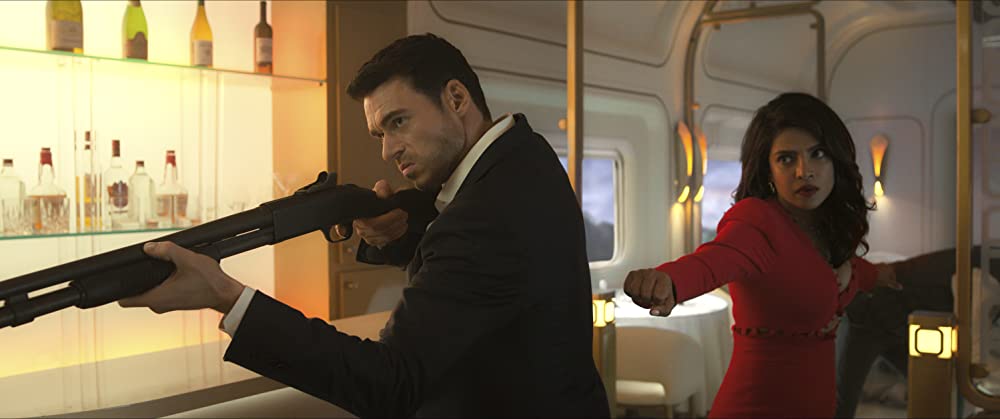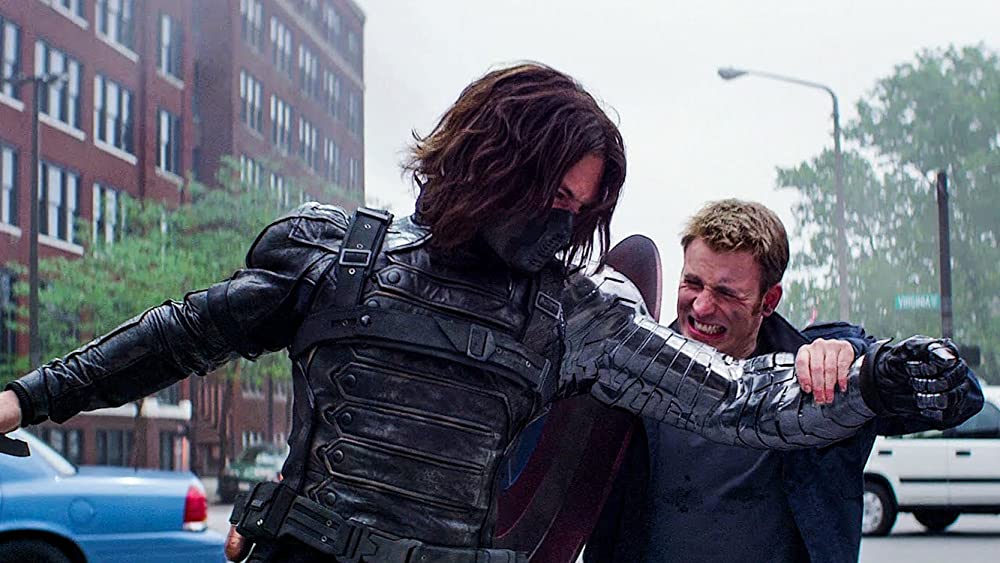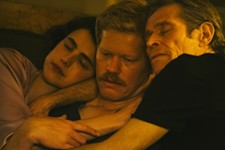Storming the Citadel With the Russo Brothers
How the new Prime series depends on global storytelling
By Richard Whittaker, 2:01PM, Fri. May 5, 2023

Joe Russo knows what makes a good espionage thriller. First off? "The mystery. It's how the onion gets pulled apart as the story unfolds." And the second part? "Characters. You have to care about the characters. They have to be hiding things that are compelling, and they have to be interacting with each other in compelling ways."
"I'll go with that," adds Anthony Russo.
Where there's Joe, there's Anthony. The brothers became household names for directing four MCU films (Captain America: The Winter Soldier Captain America: Civil War, Avengers: Infinity War, and Avengers: Endgame) together. Now they've moved from superheroes to superspies: first, directing last year's The Grey Man for Netflix, and now as executive producers of Citadel, the new high-tech spy thriller series from Amazon Prime Video.
While they have often and regularly worked separately, Joe linked their intertwined careers to what's known as the Mastermind Principle, "that two minds aren't doubly better than one, they're exponentially better, and we have found that to be true – that there's an exponential magic that occurs when we do things together. There's a vetting of ideas that fairly vigilant that would not happen independently."
For Anthony, it's linked to how they approach storytelling, as a dialogue with the audience. "That's how we start that dialogue," he added. "We start it with one another."
The idea of dual directors is almost a complete rebuttal of the concept of the auteur – an idea whose roots Anthony traced back to the very earliest days of the Hollywood studio system, "when you had very powerful actors, very powerful producers [who] would often muscle into the position of director and codirect a picture because they want some say in the manner it was being executed, or take over in some manner. The director's guild, early on, fought to prevent the position of director being parceled off into other key roles in the moviemaking process. So they came up with the idea that there is one director per film."
However, modern cinema is more open to filmmaking duos. The doors were opened by siblings like the Quays, the Coens, the Wachowskis, and Austin's own Zellners and Duplasses, but now it's common to see unrelated collaborators, like Phil Lord and Christopher Miller (The Lego Movie), Ryan Fleck and Anna Boden (Captain Marvel) and Daniels (Everything Everywhere All At Once). However there's also a more practical aspect to having two directors available on set. Modern films are working on a scale – both for individual projects and interlocking franchise storytelling – never been seen before, and that's why doubling up on directors is helpful. As Joe half-joked, one is available while the other is off somewhere, exhausted or putting out fires. "It's a very hard job," he added. "It's very demanding physically, psychically, emotionally, and it's more accomplishable as a team."
And Citadel may be the biggest team they've ever worked with. Joe said, "[Amazon Studios CEO] Jen Salke called us and said, 'Do you think you can dream up a story, a world, a universe that can be told through an English-language flagship show, and then concurrently in regional markets using regional storytelling in their own language?'" Of course, the answer was yes. "We're compelled by new ways to tell stories, and this seemed like a really noble endeavor, bringing together a diverse collection of storytellers from around the world to build a narrative together."
The Russos aren't exactly new to global storytelling, with the MCU films being a true international phenomenon. Anthony said the brothers were grateful to have been part of that experience, "and that's a powerful thing in a divided world." However, he added, "Typically, when we've been involved in that kind of storytelling, it's Hollywood-generated storytelling that travels globally. This idea was, 'How do you actually build the show globally?'"
That's why there are currently three different Citadel shows produced by their company, AGBO: the U.S. version, now streaming on Prime; one in India, starring Varun Dhawan and Samantha Ruth Prabhu (and, coincidentally being directed by another duo, Raj & DK); and a third for Italy. It's all being wrangled by head showrunner David Weil (nicknamed the spyverse master by the Russos), who meets with the creative teams once every two weeks in a "global virtual writers room together, where they discuss how each series is unfolding, what they're discovering, where they're taking the narrative," said Joe, who called it "an incredibly collaborative process in a way that, I think, has never been attempted before. ... What we love is that ability to interact constantly with fellow collaborators who have different cultural perspectives, and can really ignite great ideas."

The Russos have prior experience of these kinds of cross-project collaborative creative environments from their time with Marvel. Early on, the MCU had its brain trust, which would give feedback and guidance to filmmakers, and later the studio added what's been called the Marvel Studios Parliament, making big strategic decisions. However, both operated differently to the Citadel situation. "It was more about handing off batons at Marvel," Joe said. "Projects were being developed with very little overlap – just communication, but not overlap. These are being developed communally. A group of people are actually sitting together and developing. That's not the case at Marvel. It's more ...
"Siloed," added Anthony."Yeah, you're more in your own mini-studio," said Joe. "Anthony and I and [writers Christopher Markus and Stephen McFeely] were functioning as our own mini-studio for a decade where we were telling the story of Cap and Iron Man and Thanos, and Taika [Waititi] was over here telling his story, and James Gunn was over there telling his story."
With Citadel, the process leads to cross-pollination of ideas, styles, and concepts. Joe called the end result "a genre mash-up, but I think that's when genres tend to get more interesting, when you layer them with other genres."
The brothers are synonymous with such mashups, but that's not where their career seemed to be heading when they started. They got their directing start after their debut, Pieces, was noticed by Steven Soderbergh. They looked set for a career in comedy, first as feature directors with 2002's Welcome to Collinwood and then on format-busting shows like Arrested Development and The Increasingly Poor Decisions of Todd Margaret. But it was Joe's season-ending two-parter for higher ed sitcom Community, the spaghetti western-spoofing double-barrel blast of "A Fist for Paintballs" and "For a Few Paintballs More," that really set the stage for their reputation as genre fusion experts: first with the espionage elements of Winter Soldier, and then really grasping how to integrate superheroics with epic SF for the wrap-up to Marvel's Infinity War saga. All, of course, on a grand scale.
Anthony explained, "Joe and I have worked a lot in storytelling that involves action or big set pieces, big ideas..."
"Big ensembles," added Joe.
"Exactly," added Anthony. "Big scope in terms of what the composition is." But the basis remains one of those pillars of Joe's pillars of espionage drama: Character. Anthony continued, "We look at the characters that we want to explore in the story, how we can test them, where are the places we can push them, and we use that as our guide through the narrative."
In the case of the English-language Citadel station house, the characters are Kyle Conroy (Richard Madden) and Charlotte Vernon (Priyanka Chopra Jonas), two ordinary people who discover that they are really Mason Kane and Nadia Sinh, seemingly the last two Citadel field agents alive. The only problem is that they have no memory of that prior life. Talk about a secret identity. "That's the science fiction element," said Joe. "When you work in an agency that can erase all the memories of what brought you together, and you go build a new life and then realize that you had a prior life with someone else, those were the most compelling concepts to us."
Citadel episode 3 is available on Prime today.
A note to readers: Bold and uncensored, The Austin Chronicle has been Austin’s independent news source for over 40 years, expressing the community’s political and environmental concerns and supporting its active cultural scene. Now more than ever, we need your support to continue supplying Austin with independent, free press. If real news is important to you, please consider making a donation of $5, $10 or whatever you can afford, to help keep our journalism on stands.
June 27, 2024
June 28, 2024
Citadel, Joe Russo, Anthony Russo, Prime Video, Amazon Studios








